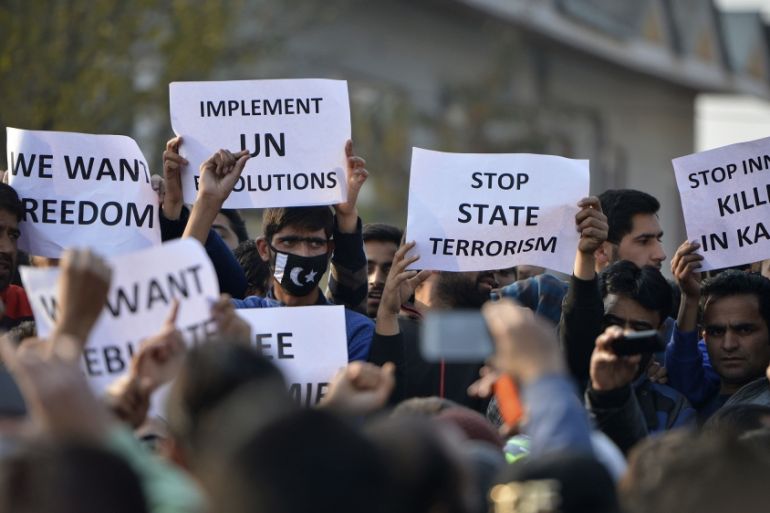Kashmiris see ‘little hope’ in India’s dialogue offer
Activists and civilians say government’s appointment of interlocutor is nothing new, as past talks bore no results.

Srinagar, Indian-administered Kashmir – India’s Prime Minister Narendra Modi has appointed a former intelligence chief as an interlocutor to hold talks with “stakeholders” in Indian-administered Kashmir to find a political solution to the Kashmir issue.
The appointment of former Intelligence Bureau chief Dineshwar Sharma, who has been tasked with holding talks with Kashmiri leaders, including separatists, is a break from the Modi government’s hardline policy in the past three years.
Keep reading
list of 4 itemsPalestinian Prisoner’s Day: How many are still in Israeli detention?
‘Mama we’re dying’: Only able to hear her kids in Gaza in their final days
Europe pledges to boost aid to Sudan on unwelcome war anniversary
People in the Muslim-majority region see “little hope” of a breakthrough as similar initiatives in the past have failed to address the problem of Kashmir, which has seen an increased unrest in recent years.
Earlier this week, India’s Home Minister Rajnath Singh made the announcement about the appointment of Sharma to reach out to people in the disputed region, which is claimed by both India and Pakistan in entirety.
After the 2016 bloody summer during which more than 100 protesters were killed and hundreds were maimed and blinded by pellet guns, people have little hopes. They are sceptical that it will make any difference on the ground.
A Kashmir-based political analyst, Noor Ahmad Baba told Al Jazeera that the approach of the government headed by the Hindu nationalist Bharatiya Janata Party (BJP) in the past few years has created a trust deficit among the common people.
“Kashmir dispute is a complex problem and it cannot be solved by one person with vague political mandate,” Baba said.
“It is also important to know what kind of mandate the person has and with whom is he going to talk to in Kashmir. In the past, there have been many working groups constituted by the [successive] Indian government[s]. No one even touched their reports and recommendations, so it is not going to change much on the ground,” he said.
Trust deficit
Pointing out that there is a resentment among the people, Baba said that the BJP government needs to recognise the political dimension of the Kashmir issue.
The previous UPA government headed by the Congress party had formed three-member interlocutors in 2010 to hold dialogue with all sections of Kashmiri leadership, but their recommendations were not followed through.
Khurram Parvez, a human rights activist based in Srinagar, says that the government should make the terms of reference clear as what the term ‘interlocutor’ means to Kashmir.
“Many people came in the past for dialogue but nothing meaningful happened. If they will talk to the same people with whom Indian government has been talking to, the result is going to be the same,” Parvez said, adding that the stakeholders in Kashmir conflict are India, Pakistan and separatists and if anyone of these is not consulted the exercise will be futile.
Ghulam Muhammad, a resident of Kashmir’s main city of Srinagar, said that the appointment of interlocutor is “just a repetition of deceit, distraction and denial from the ground reality”.
“These things no longer excite or surprise any Kashmiri. These are the tricks of this government that has been dealing with civilian protesters with an iron fist and now they want to buy time from the ground reality,” the 40-year-old said.
The Indian government tried to send a number of delegations to Kashmir as part of its initiatives to stop the armed rebellion in the 1990s, when it was at its peak.
The 2010 interlocutors group was appointed after five months of civilian uprising that claimed more than 120 civilian lives. The team comprising of Dilip Padgaonkar, MM Ansari and Professor Radha Kumar came up with a report, which was never taken seriously and the recommendations were ignored which created a trust deficit.
Anti-militancy operation continues
After Sharma’s appointment as the government’s emissary, the army chief Bipin Rawat said that the step will not impact its anti-insurgency operation in Kashmir, referring to the continuation of its operation against rebels.
Many believe that rebels are an important part of Kashmir dispute and any attempt made without their involvement is not going to bring any solution.
“At some level, the militants have to be taken into consideration. They are not the problem but they are the product of the conflict, they need to be assessed and their problems need to be addressed,” Noor Baba from the Central University of Kashmir said.
The Indian security forces have launched a major counterinsurgency operation, which has resulted in killing more than 130 fighters and civilians this year, according to officials.
On August 15 this year, on the India’s 70th Independence Day, Prime Minister Modi insisted that “abuse and bullets’ will not solve Kashmir issue, but “embracing Kashmiris” will do.
But local Kashmiris say there has been no relief from the continuous bloodshed.
“We have not seen anything other than the cosmetic treatment and now we don’t expect anything extraordinary this time,” said Suhail Ahmad, a local resident.
Long-pending dispute
Nuclear-armed rivals India and Pakistan each administer part of Kashmir.
Rebel groups have been fighting since 1989 for the Indian-administered portion to either become independent or merge with Pakistan.
Nearly 70,000 people have been killed in the uprising and the ensuing Indian military crackdown. India maintains roughly half a million soldiers in the territory.
India accuses Pakistan of arming and training the rebels, which Pakistan denies.
Rebel groups have largely been suppressed by Indian forces in recent years and public opposition to Indian rule is now principally expressed through street protests.